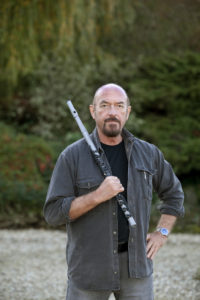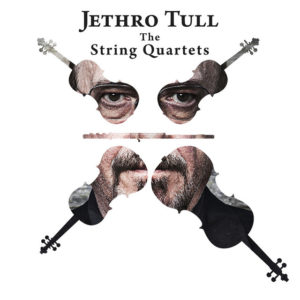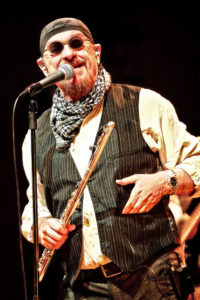
One of the most unique bands in the history of rock and roll, Jethro Tull carved out a reputation for musical excellence, a delightfully off-kilter approach to music and for their theatrical live shows, to become one of the most compelling – and successful – rock acts of the 1970s.
The band created a string of hit albums and songs that have become enmeshed in the lexicon of popular culture, such as Locomotive Breath, Aqualung, Bungle In the Jungle, Thick as a Brick, Living in the Past, and many more. Led by the mesmerizing minstrel-like frontman, Ian Anderson – he of the flute and the one-legged stance – the band captivated audiences around the world, through a number of lineup changes until the band essentially became Anderson and a collection of solid musicians to back him up, as Jethro Tull moved into the new millennium.
But regardless of the status of the band, the music of Jethro Tull continues to get regular airplay on classic rock formats on terrestrial and satellite radio, and new legions of fans are showing up at the band’s concerts – of which Anderson and his troupe still perform to great acclaim throughout the world.
Although on many online sources it seems that Jethro Tull ended in 2011, Anderson still incorporates the band name into billing when he goes on tour. But a number of years ago, he did begin using his own name more and more as he wanted it to be more readily identified with the music of Jethro Tull, since he is the only original member, the focal point and primary songwriter.
“Since about 2004 or 2005 I have used my own name in the billing and I am tending to use my own name in there because I suppose after all these years there are still people who think I am Jethro Tull, that it’s the name of the guy who stands on one leg and plays the flute. And since I am not going to be going on forever, I am an old chap, I rather like the idea that people might know my name if they are more casual fans of Jethro Tull’s musical repertoire over the years. But the thing that doesn’t go away – the thing that is not ‘retired’ is the name Jethro Tull, which is in two very distinct forms,” said Anderson, from his home in the U.K.
“Number one, most correctly and properly, it is the name of an 18th century agriculturalist who invented the seed drill and is part of British and international history in terms of being on the forefront of the second agricultural revolution … He wasn’t alone in coming up with the ideas of mechanization and more organized approaches towards husbandry of crops and animals, but he is the one that the history books remember.
“And our agent at the time we were starting out, who studied history in university, decided this would be a good name for our band. I unfortunately had not studied the history of that period at school and I didn’t know who the hell Jethro Tull was. I thought it was a name he made up. But that’s the name we ended up with for all those years as a rock band. If you look up Jethro Tull, you will see two main references – Jethro Tull the band and Jethro Tull the agriculturalist. And you have to remember that it was his name first and we are guilty as charged with identity theft.”
Anderson said while the formal entity or Jethro Tull may have ceased in 2011, ‘Jethro Tull by Ian Anderson’ is still a going concern and is playing one Canadian date on its summer tour, Aug. 20 at Caesar’s Windsor casino. He treats the music of Jethro Tull as its own entity and believes that legacy will live on long past the time he is performing it.
“If we’re limiting it to talking about Jethro Tull the music, then we are talking the Jethro Tull repertoire. So if I asked you if you liked classical music and you said yes and then I asked if you liked Beethoven and you said yes, I would assume the answer was not that you really liked Ludwig van Beethoven, that you thought he was a nice man and that you used to get together with him and that you knew his wife and children. We’re not talking about the man. When you mean when you say you like Beethoven is you like the repertoire, you like the creative legacy of the works of Beethoven. Even if you say you love the Beatles, you’re talking about the love for their music and that doesn’t die. When the Beatles are gone, and two of them already are, the reality is we will still go on talking in terms of ‘oh I love the Beatles.’ What we mean is the music,” he said.
 “It’s hard for me to imagine a thousand years from now that people will not still listen to the works of Led Zeppelin. Of course it’s going to go on, just like the music of the great classicists goes on. And I think in that sense I probably see Jethro Tull in a very modest way in that kind of capacity – the music goes on and at least for some people, it will survive long after my demise. But just in this sort of final phase, however long I am lucky enough to enjoy, I just feel that maybe it’s time I put my own name into the mix, so I do.
“It’s hard for me to imagine a thousand years from now that people will not still listen to the works of Led Zeppelin. Of course it’s going to go on, just like the music of the great classicists goes on. And I think in that sense I probably see Jethro Tull in a very modest way in that kind of capacity – the music goes on and at least for some people, it will survive long after my demise. But just in this sort of final phase, however long I am lucky enough to enjoy, I just feel that maybe it’s time I put my own name into the mix, so I do.
“Jethro Tull as a band, is an entity of between 30 to 35 members in total, depending on whether you count some special guest musicians who played with us for some tours. It’s a minimum of 30 people who have played under that name. it’s an awful lot of folks over the years who have been a part of that band. The guys who are playing with me now [bassist David Goodier, keyboardist John O’Hara, guitarist Florian Opahie and drummer Scott Hammond] are guys who have been playing with me and as members of Jethro Tull for about 12 years.”
For their summer 2017 North American tour, which begins Aug. 13 in Pennsylvania at the Bethlehem MusikFest, and runs until Aug. 22, at Keybank Presents Tuesday in the Park in Lewiston, NY, Anderson said there is going to be a fan-friendly selection of Jethro Tull classics. For the Windsor show, which he said has a shorter set time, it will be a condensed – but still hit-packed set.
“At the outdoor festivals or performing arts centres in the USA I think the expectation is Jethro Tull’s rock music, played the way it was recorded. And that’s essentially what I am doing and what I will be doing in Windsor, bearing in mind that the Windsor show is a Casino date and they have a distinct preference for a relatively short single set because, understandably, they like to get those people through the door to spend money on food and slot machines and roulette wheels. That’s the way casinos work and the good ones, like Windsor, have good theatres and are great places to play, some of them are very theatrical and have very good facilities. It’s a different animal so we have to try to shoehorn into a single set what we would normally put into two 55-minutes ply sets of a show, plus a 15-minute intermission, which is what I prefer to do, and I am fine with that,” Anderson said.
“So it will essentially be the same set as all the other shows, minus a few pieces. And I have more than 100 songs to draw upon, whittle it down initially to 50 and then whittle that down to about 20 for a particular tour. The set list may change from tour to tour and sometimes it changes from day to day, so I like to have about 20 songs ready to go. If I am playing a longer show in a concert hall where it’s just our show, there may be a few changes to the set list to reflect the fact that we’re playing to a seated audience in a nice, climate-controlled concert hall. But the next day we could be outside in amongst the elements and it’s a standing audience. So in those instances a sense of urgency prevails and you’ve got to crack on with it and deliver the goods and not get too esoteric in front of an audience that has probably already had far too much to drink and is getting a little weary because they have been standing for the past five hours.”
Anderson and his Jethro Tull show performs between 75 to 100 shows a year, which is still quite ambitious. He said he could do more, but prefers to spend at least half the year of the road.
“If you play 100 shows, the chances are that means you’re gone for between 160 to 180 days including travel days, rehearsal days and other days that are adding to the workload and being away from home. That means you’re not sleeping in your own bed. And I have a preference, and always have, for playing rather shorter tours. I would rather go away and do two or three shows over say six days, than be away for two or three weeks playing 12 to 15 shows, which is just a bit too long to be away from your own home environment, especially if you’ve been doing it for most of your life. And I do like being at home.”
 On tour, particularly at outdoor festivals, Anderson said there is quite a wide range of ages of fans coming to hear the music of Jethro Tull.
On tour, particularly at outdoor festivals, Anderson said there is quite a wide range of ages of fans coming to hear the music of Jethro Tull.
“When I am playing in a concert hall it’s going to be predominantly couples, mostly in their 50s or 60s, that’s going to be the broad core of the audience. If we’re going to be playing an outdoor show, I will look out and our audience will all seem to be people in their late teens and 20s because the young kids tend to come to the front; they want to see the show, they want to get up close and personal, whereas the older part of the demographic hovers around the back. So what we perceive from the stage probably exaggerates the difference. If you’re indoors in a nice concert hall, then the front rows tend to be taken up by the more affluent middle classes in their middle to senior years. And the reverse is true if you’re playing a rock festival in the summer,” he said, postulating as to how younger folks are being introduced to Jethro Tull.
“I think there are two possible directions. They hear it because it’s what their parents listen to and it’s a way in which people do connect to their parents’ generation and their parents as people. And it’s possible they are aware of the music having heard it in a more subliminal way as very small children around the house, or perhaps they discover a bunch of CDs or vinyl lurking in the corner of a room and get curious as to what their parents listen to.
“The other part of the reason is that anybody who likes rock music of any era is going to sooner or later stumble upon the fact that there is nothing really new. Therefore, for a lot of people, the curiosity of where did this come from, meaning the modern version of rock music, reveals that they are probably going to enjoy the music of Cream and Jimi Hendrix or Deep Purple, because that’s the origins of what is a very forceful, energetic, youthful music that is not so different musically as to what today is the current state of rock music. It can’t really change that much and still be called rock music. At some point in this process, a song or two from Jethro Tull will inevitably crop up, and perhaps tweak that individual’s curiosity.”
While Jethro Tull has released 21 studio albums, the last being a Christmas album in 2003, fans of the band have a chance to hear a unique interpretation of the band’s classic songs in a new album called Jethro Tull: The String Quartets. Performed by the Carducci Quartet, arranged and accompanied by John O’Hara and featuring Anderson on flute and vocals, the album is comprised of 12 songs that have been re-imagined to the point where they were given different names than the originals.
“It’s all about trying to demonstrate, I suppose for my own satisfaction as well as perhaps for the listener, that a good tune can cross genres. There are three main elements that make up music, which are essentially melody, harmony and rhythm. If you take those elements and reconsider them, then you find you can dress up a tune in a completely different set of clothes, stylistically speaking, and trot it down the street and people will say, ‘oh I think I recognize you, boy do you look different today. Who is your tailor? Who did your makeup?’” Anderson said.
“That’s the way it is with music and I think that, in a way, it’s rather satisfying to know that regarding those elements of music, sometimes you can send them sideways off into a completely different zone and still the essential elements ring true. And because you see them in a different context, sometimes it gives you a different appreciation of the composition and the nature of the music.”
 Some of the songs featured on the album include Bungle (Bungle in the Jungle), Farm, The Fourway (Farm on the Freeway), Only the Giving (Wond’ring Aloud), Pass the Bottle ( A Christmas Song), Loco (Locomotive Breath) and Aquafugue (Aqualung).
Some of the songs featured on the album include Bungle (Bungle in the Jungle), Farm, The Fourway (Farm on the Freeway), Only the Giving (Wond’ring Aloud), Pass the Bottle ( A Christmas Song), Loco (Locomotive Breath) and Aquafugue (Aqualung).
2018 marks the 50th anniversary of Jethro Tull’s formation. Anderson said plans are already afoot for a special tour, although he admits to being a somewhat unsentimental participant in the planned festivities.
“There will be three tours of the USA involving a few shows in Canada which are currently in the mix. But it won’t be me celebrating 50 years of Jethro Tull because I am not a birthday or anniversary guy. I recognize that fact for the fans and I suppose also for agents, promoters and people in the media as they like the marketing advantage of the opportunity to hang their hats on something, at least for 12 months, that seems a bit special. And of course, the 50th won’t ever come again, so for that reason I decided just a couple of weeks ago that oh, alright, I will get behind the 50th anniversary stuff and grin and bear it for 12 months,” he said.
“However I will do it with goodwill, a smile on my face and try and do it in the same spirit as I have entering into my 71st year in a month’s time, because I will be 70 years old at that point {Aug. 10} and, again, it’s not something I really want to make a fuss over.”
Jethro Tull: The String Quartets was released in the spring through The End Records/BMG and is available at most online music retailers. For more information about the album, current touring plans and the forthcoming 50th anniversary tour, visit www.jethrotull.com.
- Jim Barber is a veteran award-winning journalist and author based in Napanee, ON, who has been writing about music and musicians for a quarter of a century. Besides his journalistic endeavours, he now works as a communications and marketing specialist. Contact him at jimbarberwritingservices@gmail.com.
SHARE THIS POST:
